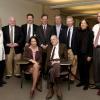DISCC - The Duke Information System for Cardiovascular Care
To request DISCC data / analytics support: https://redcap.duke.edu/redcap/surveys/?s=T9NDHLAFJ3
DISCC traces its roots back to 1969 with the establishment of the Duke DataBank for Cardiovascular Disease (DDCD), a research group within Duke University Medical Center. The Databank was the result of an idea of then-Chairman of Medicine, Eugene A. Stead, Jr., MD, who envisioned it as a "computerized textbook of medicine," using information gathered by one physician today to help other physicians care for similar patients tomorrow.
The DataBank is the world's oldest and largest cardiovascular database. Notable historical milestones include:
- 1969 - coronary artery bypass surgery procedure documentation
- 1971 - cardiac catheterization procedure documentation
- 1975 - creation of The Medical Record (TMR) by Edward Hammond
- 1976 - Duke DataBank for Cardiovascular Disease formally created (Robert A. Rosati named Director); DDCD converted to TMR; nuclear medicine, treadmill added
- 1981 - Duke Activity Specific Index (DASI) treadmill risk score developed
- 1983 - Robert M.Califf and David B. Pryor named clinical research Co-Directors
- 1993 - Donald F. Fortin named director
- 1994 - TMR converted to structured data model
- 1996 - Duke Clinical Research Institute (DCRI) created from the DDCD; DDCD expanded to include oversight of Heart IT systems across DUHS; James E. Tcheng named DISCC Director
- 2001 - DISCC brought under the auspices of the Duke Heart Center / Duke University Hospital
- 2012 - partnership with Lumedx, Inc. initiated to bring structured reporting to the Duke Heart service line; initiation of Lumedx-based development
- 2015 - structured reporting - cardiothoracic surgery
- 2016 - structured reporting - cardiac catheterization
- 2017 - structured reporting - electrophysiology
- 2019 - structured reporting - echocardiography, peripheral vascular disease
For information about the relationship of the DDCD as the foundation of the DCRI: https://dcri.org/about/who-we-are

50 Years of DISCC Leadership - from 1969 to 2019